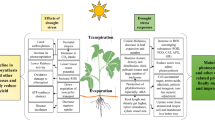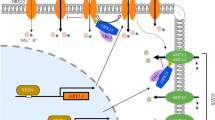Abstract
Heat stress from chronic, prolonged exposure up to 32 °C or heat shock from brief exposure to 33 °C and above alters the source of assimilates for grain growth of wheat (Triticum asetivum L.). Our objectives were to identify genotypes that resist chronic heat stress and heat shock and to determine the relative contributions of photosynthesis and stem reserves to grain filling under both conditions. Twenty-eight genotypes were grown in controlled enviroments at 20/15 and 30/25 °C day/night in light and darkness during maturation in the first experiment, and six genotypes were grown in light at the same temperatures and at 40/35 °C followed by 20/15 or 30/25 °C in the second experimnet. Heat susceptibility indices (HSI) were calculated from grain yields of the genotypes in both experiments. The ratio of chlorophyll variable fluorescence to maximum fluorescence (Fv/Fm), a measure of the stability of photosynthesis, and carbohydrate reserves in the stems were measured in the second experiment. Photosynthesis provided 63 and 65% of assimilates in the grain at 20/15 and 30/25 °C, respectively, but both stable photosynthesis in some genotypes and high content of reserves in other genotypes were associated with low susceptibility to stress. The Fv/Fm ratio was decreased by heat shock and returned to normal values intolerant genotypes when the treatment was followed by 20/15 °C but not 30/25 °C. Grain yield was highly correlated among 20/15, 30/25, and 40/35 °C followed by 20/15 °C treatments, suggesting that similar plant traits were involved. We conclude that assimilates from either stable photosynthesis or high reserve levels provided for high grain yields during heat stress. Combining the two traits could improve heat tolerance of wheat but might not be feasible if other traits are impeded.
Similar content being viewed by others
References
Al-Khatib, K. & G.M. Paulsen, 1990. Photosynthesis and productivity during high temperature stress of wheat genotypes from major world regions. Crop Sci 30: 1127–1132.
Blum, A., 1996. Yield potential and drought resistance: Are they mutually exclusive? In: M.P. Reynolds, S. Rajaram & A. McNab (Eds.), Increasing Yield Potential in Wheat: Breaking the Barriers, pp. 90–100. CIMMYT, Mexico, DF, Mexico.
Blum, A., 1998. Improving wheat grain filling under stress by stem reserve mobilization. Euphytica 100: 77–83.
Blum, A., B. Sinmena, J. Mayer, G. Golan & L. Shpiler, 1994. Stem reserve mobilisation supports wheat grain-filling under heat stress. Aust J Plant Physiol 21: 771–781.
Chowdhury, S. & I.F. Wardlaw, 1978. The effect of temperature on kernel development in cereals. Aust J Agric Res 29: 205–223.
Dubois, M., K.A. Gilles, J.K. Hamilton, P.A. Rebers & F. Smith, 1956. Colorimetric method for determination of sugars and related substances. Anal Chem 28: 350–356.
Evans, L.T., I.F. Wardlaw & R.A. Fischer, 1975. Wheat. In: L.T. Evans (Ed.), Crop Physiology: Some Case Histories, pp. 101–149. Cambridge University Press, Cambridge, UK.
Fischer, R.A. & R. Maurer, 1978. Drought resistance in spring wheat cultivars. I. Grain yield response. Aust J Agric Res 29: 897–907.
Hossain, A.B.S., R.G. Sears, T.S. Cox & G.M. Paulsen, 1990. Desiccation tolerance and its relationship to assimilate partitioning in winter wheat. Crop Sci 30: 622–627.
Hunt, L.A., 1979. Stem weight changes during grain filling in wheat from diverse sources. In: S. Ramanujam (Ed.), Proc 5th Int Wheat Genet Symp, pp. 923–927. Indian Society of Genetics and Plant Breeding, New Delhi.
Khanna-Chopra, R. & C. Viswanathan, 1999. Evaluation of heat stress tolerance in irrigated environment of T. aestivum and related species. I. Stability in yield and yield components. Euphytica 106: 169–180.
Kühbauch, W. & U. Thome, 1989. Nonstructural carbohydrates of wheat stems as influenced by sink-source manipulations. J Plant Physiol 134: 243–250.
Moffatt, J.M., R.G. Sears, T.S. Cox & G.M. Paulsen, 1990a. Wheat high temperature tolerance during reproductive growth. II. Genetic analysis of chlorophyll fluorescence. Crop Sci 30: 886–889.
Moffatt, J.M., R.G. Sears & G.M. Paulsen, 1990b. Wheat high temperature tolerance during reproductive growth. I. Evaluation by chlorophyll fluorescence. Crop Sci 30: 881–885.
Nalewaja, J.D. & L.H. Smith, 1963. Standard procedure for the quantitative determination of individual sugars and total soluble carbohydrate materials in plant extracts. Agron J 55: 523–525.
Paulsen, G.M., 1994. High temperature responses of crop plants. In: K.J. Boote, I.M. Bennet, T.R. Sinclair & G.M. Paulsen (Eds.), Physiology and Determination of Crop Yield, pp. 365–389.
American Society of Agronomy, Madison, WI. Porter, J.R. & M. Gawith, 1999. Temperature and the growth and deveploment of wheat: A review. Eur J Agron 10: 23–36.
Reynolds, M.P., M. Balota, M.I.B. Delgado, I. Amani, & R.A. Fischer, 1994. Physiological and morphological traits associated with spring wheat yield under hot, irrigated conditions. Aust J Plant Physiol 21: 717–730.
SAS, 1995. Release 6.11 TS040 for windows. SAS Institute, Inc., Cary, NC.
Savin, R., P.J. Stone, M.E. Nicolas & I.F. Wardlaw, 1997. Grain growth and malting quality of barley. I. Effects of heat stress and moderately high temperature. Aust J Agric Res 28: 616–624.
Shukla, D.S., N.K. Gupta, S.B. Kapashi, P.S. Deshmukh, R.K. Sairam & P.C. Pande, 1997. Relationship between stem reserves and grain development in terminal heat stress susceptible and tolerant wheat genotypes. Indian J Plant Physiol 2: 36–40.
Wardlaw, I.F., 1993. Temperature effects on source-sink relationships: A review. In: C. G. Kao (Ed.), Adaptation of Food Crops to Temperature and Water Stress, pp. 13–18. Proc Int Symp, Asian Vegetable Research and Development Center, Taipei, Taiwan.
Wardlaw, I.F., I.A. Dawson & P. Munibi, 1989a. The tolerance of wheat to high temperatures during reproductive growth. II. Grain development. Aust J Agric Res 40: 15–24.
Wardlaw, I.F., I.A. Dawson, P. Munibi & R. Fewster, 1989b. The tolerance of wheat to high temperatures during reproductive growth. I. Survey procedures and general response patterns. Aust J Agric Res 40: 1–13.
Wardlaw, I.F. & L. Moncur, 1995. The response of wheat to high temperature following anthesis. I. The rate and duration of kernel filling. Aust J Plant Physiol 22, 391–397.
Wardlaw, I.F. & C.W. Wrigley, 1994. Heat tolerance in temperate cereals: An overview. Aust J Plant Physiol 21: 695–703.
Author information
Authors and Affiliations
Rights and permissions
About this article
Cite this article
Yang, J., Sears, R., Gill, B. et al. Genotypic differences in utilization of assimilate sources during maturation of wheat under chronic heat and heat shock stresses. Euphytica 125, 179–188 (2002). https://doi.org/10.1023/A:1015882825112
Issue Date:
DOI: https://doi.org/10.1023/A:1015882825112




